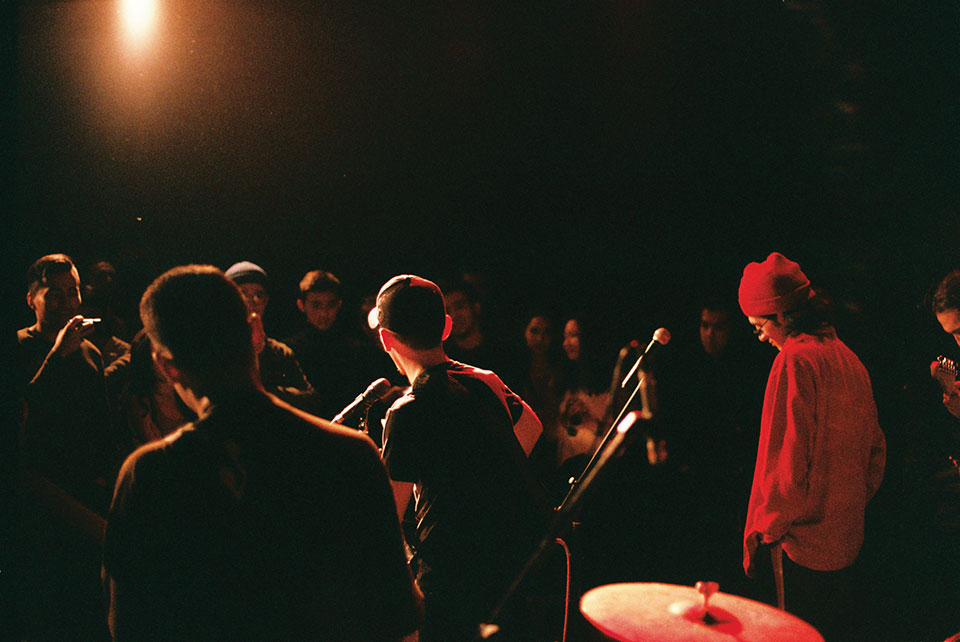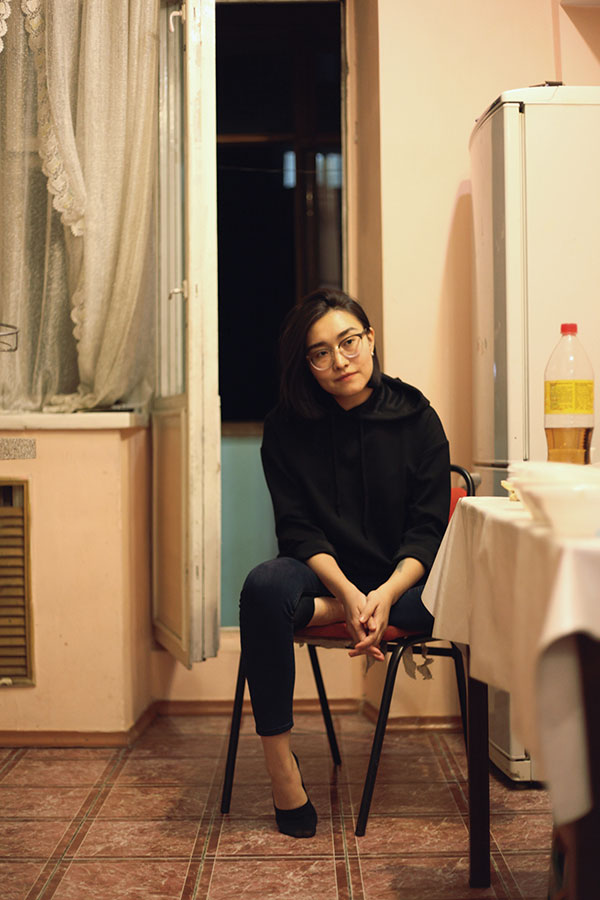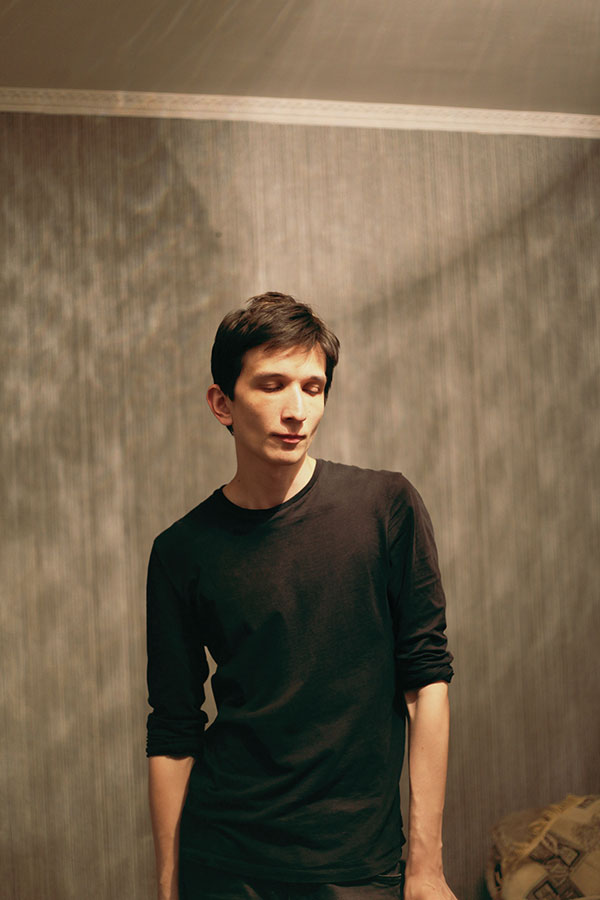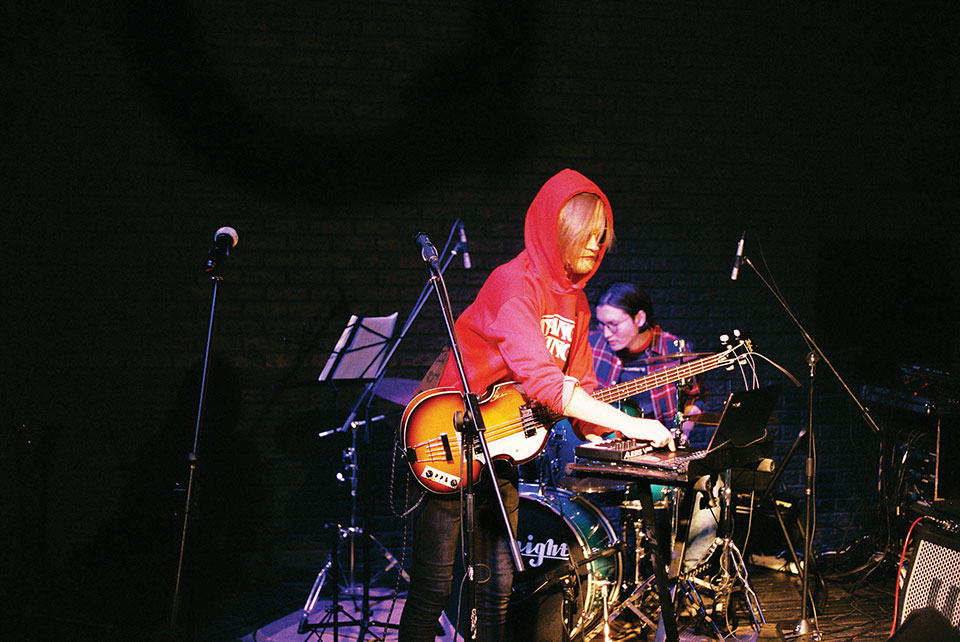Almaty’s Changing Musical Rule Book

Traveling across central Asia, Nicholas Pritchard discovers musical acts of dissent in Almaty, Kazakhstan.
Our problems have now risen to such a height as to render any solutions seemingly superfluous. Climate disasters, widening economic inequality, and the strong hands of the authoritarian close in on all sides. Confusion is the only state we can be certain of. One could be forgiven for thinking that we are all heading straight down into darkness. And yet acts of dissent are visible from all corners of the globe—one of which is to be seen in Almaty, Kazakhstan’s second city, where a small number of musicians are bringing their art and activism to a country that has been hearing monotones for many years.
We met them by accident. In the center of Almaty is an old warehouse building, now called Transforma, which has been reappropriated by artists and craftspeople. It’s typical of anything you’d likely find in Shoreditch or Brooklyn; high ceilings, bare rooms with a few plastic chairs at the center, empty beer cans with cigarette butts spewing out the top. It was a Saturday when we arrived, and there weren’t many people. We saw only a figure slouched in a darkened corner and, opposite, a tall, slim couple fitting T-shirts to mannequins under bright lights. Ruslan would tell us later that rents were rising and everyone was getting ready to move out.
It was our last day in central Asia. I’d traveled with a photographer, Pauline Blanchet, for the last several weeks from Turkey, across the Caspian, through Uzbekistan, Tajikistan, and Kyrgyzstan. The day before we’d taken shared taxis and hitchhiked through the east of Kyrgyzstan and into Kazakhstan. The border crossing was a small cluster of buildings, and the steppes were wide and fertile until they reached the snowy mountains that are China’s western border. We’d arranged to go to a BBQ with some people who were based at Transforma, but when we arrived, there was no one there, only a café worker reclining next to an enormous statue of the Hindu god Ganesh. Dejected, we headed up the metal staircase to find the closest bar.
“Can I help you?” That’s Ruslan. He’s tall and skinny with an authoritative face of clear skin, strong cheekbones, and a general demeanor bordering on the angelic. He says that he’s a creative producer for a group called Qazaq Indie, working with musicians and poets, one of which, a poet, sidles up beside him. “This is Samrat,” he says, pointing at the man next to him. There was to be a concert that night featuring some of the acts Ruslan is involved with. Will we meet him there and he can tell us about his work? Samrat agrees to show us the way to the venue.
Walking past Soviet-era monuments and the burgeoning array of Dior, Gucci, and Versace stores, the three of us begin to discuss Kazakh politics. The republic was formed in 1991 following the collapse of the Soviet Union. Nursultan Nazarbayev took the president’s office and held it until March 2019 when his chosen successor, Kassym-Jomart Tokayev, took over—though Nazarbayev still holds various positions including head of the Nur Otan political party. Protests against the government have started to grow in size and scope of demands. The day before, on Constitution Day, thousands of soldiers and black-suited security officials had been brought into Almaty in anticipation of demonstrations.
Protests against the government have started to grow in size and scope of demands.
Samrat tells us of an activist group called Wake Up, Kazakhstan! (“Oyan Qazaqstan” in Kazakh). They campaign for the abolition of the presidency and the establishment of a parliamentary democracy. “I’m not a member, but I agree with them,” says Samrat. The group gained popularity on Instagram and is aimed at Kazakh youth. Without a leadership structure per se, Wake Up relies on a few prominent personalities, one of whom is a pop-music producer and actor who created one of the initial videos that went viral. The video shows talking heads in front of a white background imploring the viewer to consider their democratic positions. Wake Up staged a small protest on Constitution Day, holding banners that read, “Down with the Autocratic System!” But protest is still dangerous in Kazakhstan; in March, two people were arrested for encouraging others to stand up to the government.
Samrat publishes his poems under the pen name Samrat the Samurai. His poem “Uzumaki Naruto” can be seen as a rewriting of Auden’s “September 1, 1939”; a depiction of the strength of the state over the individual. The “lawbook” gives the “rules”: “If you state the state’s law—you are guilty.” / “If you spit on the law—you are equal to god and the judge.” The paradox comes alive in our contemporary situation; it is clear something is not working, but our instruments for tackling the problem are blunt. Samrat walks past a venue where he has performed the poem. It sits not one hundred yards from the Soviet memorial, which sits on the political psyche and system like a goliath. Samrat takes us to the concert but doesn’t stay for the music.
The concert was on a street corner not far from the State Museum and Nazarbayev Avenue. A small canopy had been erected, and that served as a stage. Hundreds of people, most of them under the age of twenty-one, were watching a young man play guitar and sing in Kazakh. We found Ruslan on the periphery of the crowd. “A few months ago this would not have been possible,” he says. “Most music in the Kazakh language was wedding music. Very traditional songs, folk songs, which were not exciting. We had some underground music but it was very underground.” The Soviets had encouraged central Asian states to maintain an ethnic identity through traditional instruments and language. The music we were seeing today was a symbiosis between the Kazakh language and international—read, on the whole, Western—musical genres. It had not been going down well with everyone in Kazakhstan.
The most popular band to date that has merged Kazakh with other musical genres is Ninety-One, a mixture of K-Pop aesthetic and protest song.
The most popular band to date that has merged Kazakh with other musical genres is Ninety-One, a name referring to Kazakhstan’s year of independence. They are a mixture of K-Pop aesthetic and protest song. One of their most popular songs, “Bari Biled,” uses language similar to that used by Wake Up, Kazakhstan! to encourage the audience toward political dissent. The music video uses footage from newsreels showing missile attacks and burning battleships on old TV monitors. Nooses with sunflowers sitting in the loops are hanging from the ceiling. Conservatives in Kazakhstan have criticized the group for defiling the ethnic language. Others have attacked the band for appearing too feminine or homosexual to represent true Kazakh values. One scene in the video for “Bari Biled” has “i am the character of my life. And I choose the genre” printed in English on a white wall.
We walk with Ruslan away from the concert toward a bar his friend owns. The center of Almaty is organized into grids with huge boulevards running north–south and east–west through the city. It’s a warm night, and we walk slowly, talking all the time, comparing politics in the UK to Kazakhstan. Ruslan has just returned from a trip to Birmingham and Manchester in England, where he worked on a poetry project called Poetry Slog—Samrat is one of the artists involved. “Whenever I told someone I was from Kazakhstan, they wouldn’t say much apart from ‘Borat’ or ‘corruption,’” he said. Nevertheless, he likes the UK, mostly for the music. We reach his friend’s bar, which seems new and has a clientele mostly of artists and activists looking to buy craft beers and smoke rolled cigarettes. As we sit and talk, Ruslan occasionally breaks away from the conversation to quickly greet someone he knows from his work at Transforma.
How did he get involved with activism and the music scene in Almaty? It was always his wish to study in St. Petersburg, so he moved there to study economics. “I was starting to discover myself there; I got interested in filmmaking.” This eventually led him to meet Katerina Suvorova, a filmmaker who has created documentaries on the Aral Sea, WikiLeaks, and the band Ninety-One. “We worked on a film about activism,” Ruslan says. Through this he met technomusicians in Almaty who were making a form of underground music he hadn’t yet been exposed to. Soon the subject for the film became the subject of all his work, and he realized he wanted not only to document but to help create this music: “So now I’m inside and working as a creative producer.”


Ruslan Yakupov. Photos
by Pauline Blanchet.
Most of his work attempts to bridge the gap between the “wedding songs,” which comprise almost the entirety of the commercial market, and new forms of musical expression. The underground scene is led by ZVUK, a collective that mixes techno and activism. At performances, partygoers have worn T-shirts with the slogan “You cannot run away from the truth” in honor of a protester arrested bearing a banner of the same message at the Almaty marathon in 2019. They organized a rave by the Aral Sea, which hosted local and European DJs. “To begin with, the people in the village close by didn’t know what was going on,” says Ruslan, “but by the end you can see them dancing and joining in.”
Though Ruslan admires ZVUK and especially its founder, Nazira Kassenova—“She’s a god”—the music his acts perform is sometimes acoustic, slow, and bare compared with the driving bass of ZVUK. We finish our drinks and Ruslan invites us to dinner that night, where we can meet some of his performers. Stopping by an old Soviet supermarket to pick up wine, we take a taxi through Almaty. On the way, Ruslan explains the conflict over the Kazakh language taking place in music. “When I was in school, we didn’t care about learning Kazakh; what was important was Russian and English. All the new songs would be in Russian or English: prog-rock, electronic, hip-hop.” This meant that music in the Kazakh language stayed very traditional and as such was mainly played at weddings or family events. “Now,” continues Ruslan, “we are trying to make the Kazakh language relevant. Talk about things that matter. . . . It’s important to keep your identity alive, and we can do this through language.”

“We are trying to make the Kazakh language relevant. Talk about things that matter.”
The dinner was in a suburb of Almaty occupied by large Brutalist high-rises. Small pathways connect one building to its neighbor, and trees have been planted to give shade in the harsh summers. Ruslan can’t remember which building we are supposed to be going to; the last time he was here was for a birthday party, and he left so drunk he can’t retrace his steps. We circle around on the pathways in the dark before being spotted by Ruslan’s friends from their balcony. “Oh, here it is,” he says nonchalantly. We have wine and Turkish menemen with a type of bread found throughout central Asia called lepeshka, a round pita with a glazed lid that cracks when your thumb presses into it. All of them shared Ruslan’s hopes of bringing a renaissance to Kazakh music. From their phones they played songs by Ninety-One, the Smiths, and Dave Gerard and the Watchmen.
Malika, a performer linked to Ruslan’s organization Qazaq Indie, performs traditional Kazakh music as part of her one-person group named Me and My Invisible Orchestra. She also writes her own songs. In the living room, Pauline and I sit on the sofa, and Malika sits cross-legged on the floor with a ukulele across her lap, two friends behind either shoulder to give vocals and accompaniment on guitar. She introduces “Á Bópem”: “It’s a children’s song, to help them go to sleep.” She speaks very softly, and you have to push your head forward to catch each word, creating an anticipated silence in the room as everyone from the dinner settles on chairs, armrests, and across the floor to listen. Malika’s voice turns forceful, each breath being pushed from the lungs and every note moving into the next without a millisecond’s pause. The song turns now strong and now almost imperceptible. At times it sounds like whispers coming from across the steppes, peaks, and canyons of the Kazakh landscape. It is like air freely forming its own cadences, each sound native to the place it is heard.
London










